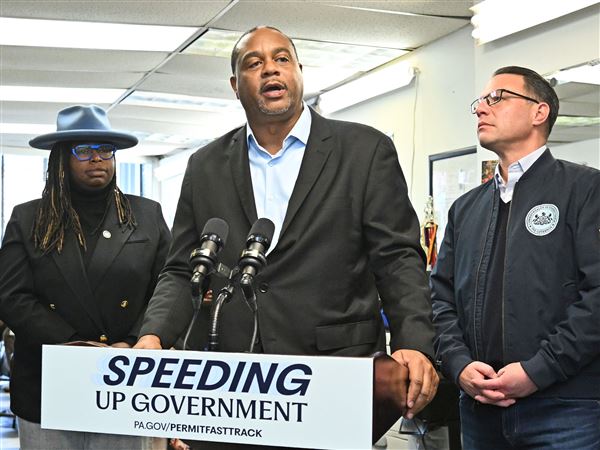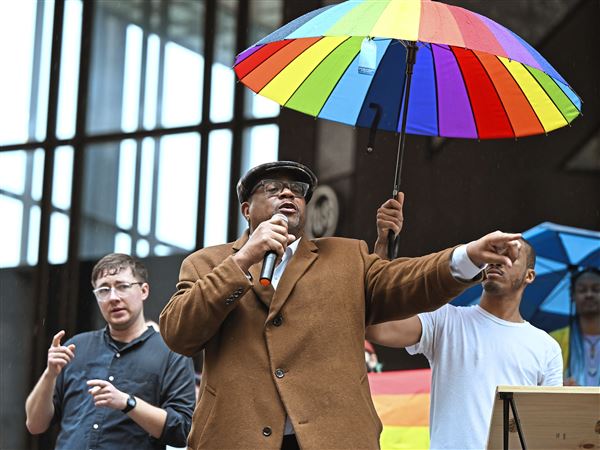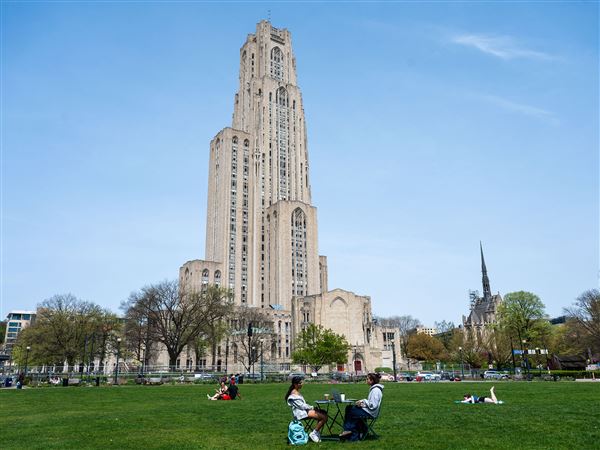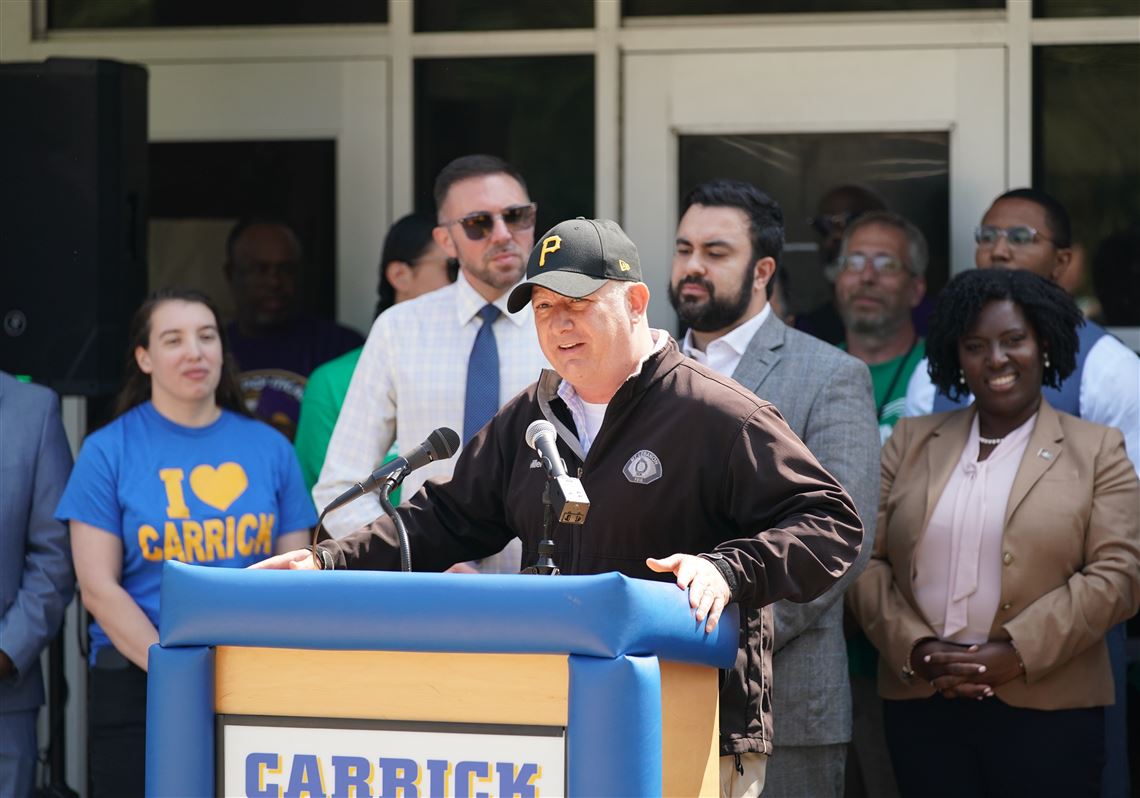Pennsylvania’s House Democratic leaders stood their ground Thursday in front of Pittsburgh Public’s Carrick High School, their message ringing loud – the state needs to invest in public education rather than spending necessary dollars on a voucher program.
The event was the last stop on the Save Our Schools tour, which took state leaders into districts across Pennsylvania to hear from administrators about challenges facing the public school system while viewing deteriorating buildings.
The tour Thursday morning came when Pennsylvania’s budget still remained at an impasse, leaving districts in the dark about how much funding they could receive during the upcoming school year. But by afternoon, the state Senate sent a $46.55 billion spending bill to Gov. Josh Shapiro for signature, ending the month-long standstill.
At Carrick High School, which will celebrate its 100th anniversary this year, House Democrats got a firsthand look at the facility where administrators highlighted career and technical programs such as carpentry and culinary arts as well as the weight room used by student athletes and a swimming pool that is open to the community.
But as they traversed the halls of the six-story building, many commented on the sweltering heat students are forced to learn in. The majority of the school is not air conditioned.
“State government has failed you,” state Rep. Jessica Benham, D-South Side, said. “We still live in a commonwealth where your ZIP code determines your educational opportunities. … These kids learn as early as kindergarten and first grade that our community has few safeguards for them.”
She highlighted disparities among school districts in the area she represents, noting one elementary school where children play in a dirt field with no playground equipment and others with unsafe walking routes to school.
The rally came hours before Senate Republicans were set to reconvene in the capital to sign part of the stalled spending plan to provide funding to schools, counties and organizations, Senate President Pro Tempore Kim Ward, R-Westmoreland, said Wednesday.
But Pennsylvania’s proposed $45.5 billion budget had been in a deadlock since July as legislators battle over a $100 million voucher-style program that would give taxpayer-funded scholarships to students in low-performing public schools so they could attend private ones.
The proposal was originally supported by Mr. Shapiro. But last month the governor signaled that he would veto the program after the majority leader in the Democratic-controlled House said there were not enough votes in the chamber to approve the program. Despite the veto, Mr. Shapiro urged lawmakers to work together to move the rest of the budget forward.
But Republicans, angered by Mr. Shapiro’s decision to veto the legislation, refused to return to Harrisburg to finalize the budget. The spending bill has already been approved by both the House and the Senate, but it must be signed in the Senate before it can go to the governor’s desk. At the time they contended that Mr. Shapiro went back on a deal that had been made surrounding the program, but the governor has stated there was no deal on school vouchers.
The way education is funded in Pennsylvania has been under scrutiny for years. In February, a Commonwealth Court judge ruled the system unconstitutional based on its reliance on property taxes. The ruling found that students in lower-income districts are deprived of the same opportunities as students in wealthier districts.
“Tell me why are kids in my community couching their future in terms of if I survive high school,” Ms. Benham said. “It is because those who have come before have created a world where your education, your safety, your future depends on where you’re from. Where we have poor schools and rich schools. Schools with air conditioning and schools where you boil inside.”
During the tour, state lawmakers stressed the importance of the public school system while emphasizing that dollars public schools spend to send students to charter and cyber schools should instead be invested internally to improve student outcomes.
As things currently stand, a funding formula requires public schools to pay tuition rates for students attending charter and cyber schools in their district. At Pittsburgh Public, the state’s second largest school district, 20% of the $684 million budget goes to charter schools. That’s $123.8 million plus an additional $4.5 million the district has to pay to transport those students.
“Public education does something even more amazing. It’s the only place in this commonwealth that educates every child,” Majority Whip Dan Miller, D-Mt. Lebanon, said. “Every child can come through these doors and they’re entitled to that education no matter their need, no matter their ability or disability, no matter how rich or how poor, no matter the color of their skin or their religion or not. They get educated in these doors fairly equally and altogether.”
Inside one of Carrick High School’s few air conditioned spaces, Nina Esposito-Visgitis, president of the Pittsburgh Federation of Teachers, touted efforts of the Democratic lawmakers.
“You have been tigers this year,” Ms. Esposito-Visgitis said. “Our school district and our teachers and educators appreciate everything you are doing. Know we appreciate the fight.”
Superintendent Wayne Walters touched on the importance of discussing public education’s future, suggesting that public schools educate the majority and create an educated citizenry who will one day become the country’s labor force. He noted that every child has the right to be educated and to have a high quality education.
Speaker of the House Joanna McClinton agreed.
“Every single child deserves the opportunity to be able to transcend whatever circumstances they were born into,” Ms. McClinton said. “We understand that education is the equalizer.”
First Published: August 3, 2023, 10:42 p.m.
Updated: August 4, 2023, 2:01 a.m.

















